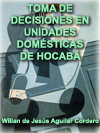Wilian de Jesús Aguilar Cordero
Esta página muestra parte del texto pero sin formato.
Puede bajarse la tesis completa en PDF comprimido ZIP (128 páginas, 1,23 Mb) pulsando aquí
Resumen
Este trabajo sistematiza las experiencias de los integrantes de las unidades domésticas de dos grupos de productores. Se analizan los procesos de decisión que condujeron a la adopción de nuevas tecnologías ofrecidas por investigadores del Departamento de Manejo y Conservación de Recursos Naturales Tropicales (PROTROPICO) de la Universidad Autónoma de Yucatán (UADY), así como los criterios para llegar a dichas decisiones, y en qué medida a ellos les permitió obtener ingresos económicos.
Se trabajó con los grupos de productores “Yaxcol” (agricultores) e “Ixchel” (artesanas); organizaciones que surgieron con la intervención de PROTROPICO, en el Municipio de Hocabá, Yucatán.
La metodología hizo énfasis en instrumentos de investigación cualitativa y cuantitativa para la obtención de datos de campo. La investigación inició con el análisis de diversos documentos existentes sobre la comunidad del municipio de Hocabá y de datos oficiales de instituciones gubernamentales, así como la realización de entrevistas semi-estructuradas a los productores y artesanas que trabajan directamente con las tecnologías; también se aplicaron cuestionarios a los y las representantes de las unidades domésticas en relación con: lugar de residencia común, composición de la familia, tamaño y los recursos materiales de que dispone, así como las actividades productivas de sus miembros e ingresos económicos, percepciones y criterios endógenos en la toma de decisiones en la adopción de tecnologías agrícolas.
La información recabada en los cuestionarios se codificó en una base datos mediante el programa Excel. Las entrevistas fueron grabadas y se transcribieron con el software Sound Transcriber y se redactaron en el editor de texto Word para su posterior codificación, para su jerarquización y análisis. Para el análisis de los datos cuantitativos se aplicó el método estadístico descriptivo, sacando frecuencias y promedios.
Las experiencias de los dos grupos de productores rurales mayas mostraron cómo los miembros de las unidades domésticas campesinas llevaron a cabo su toma de decisiones para participar, aceptar y adoptar las transferencias de tecnologías. La aceptación de las tecnologías, según los resultados del presente estudio, indica que no necesariamente implicó la continuidad y permanencia de dichas actividades, sino que hay otros factores como los de conflicto, de organización social y de empoderamiento que inciden en el tránsito hacia otra estrategia de sobrevivencia como fue el caso de Yaxcol y/o la desintegración del grupo base como fue el caso de las mujeres artesanas del grupo Ixchel.
Palabras claves: unidad doméstica, toma de decisiones, adopción, tecnologías y economía de subsistencia campesina.
Summary
This work systematizes the experiences of members the households of two groups of smallholders. We discusses the decision processes that led to the adoption of new agro-technologies offered by the PRTROPICO-UADY, and how what criteria were to arrive at such decisions and to know if the adoption allowed obtain income of their members.
It worked with the groups of producers called "Yaxcol" (small-farmers) and "Ixchel" (artisans); organizations that emerged with the intervention of the Department of Management and Conservation of Tropical Natural Resources (PROTROPICO) of the Autonomous University of Yucatán (UADY), in the municipality of Hocabá, Yucatán.
The methodology emphasized in instruments of qualitative and quantitative research for obtaining data from the work field. The investigation began with the analysis of various existing documents on the community of the municipality of Hocabá and of official data from government institutions, as well as the interviewing semi-structured to producers and artisans working directly with agro-technologies; they also implemented questionnaires to and the representatives of the household in connection with: place of residence common, composition of the family, size and material resources available to it, as well as the productive activities of its members and economic income, perceptions and criteria endogenous in decision-making in the adoption of agricultural technologies.
The information gathered in the questionnaires was codified in a database through the Excel programme. The interviews were recorded and were transcribed with software Sound Transcriber and were drafted in the text editor Word for their subsequent codification, for its hierarchisation and analysis. For the analysis of quantitative data was applied the statistical method descriptive, drawing frequencies and averages.
The experiences of the two groups of rural producers Maya showed how members of household peasant carried out their decision making to participate, accept and adopt the transfers of agro-technologies. The acceptance of the agro-technologies, according to the results of this study, indicates that does not necessarily implied the continuity and permanence of such activities, but that there are other factors such as those of conflict, of social organization and of empowerment that impact on transit towards another strategy of survival as was the case of Yaxcol and/or the disintegration of the group basis as was the case of women artisans of the group Ixchel.
Keywords: household, decision making, adoption, agro-technologies and peasant of economy of subsistence.


